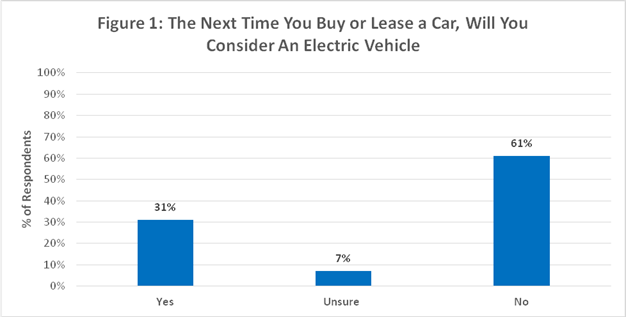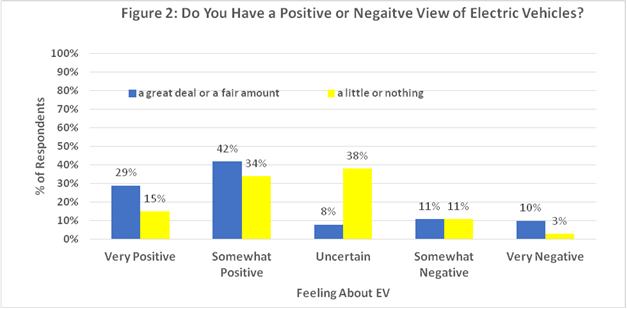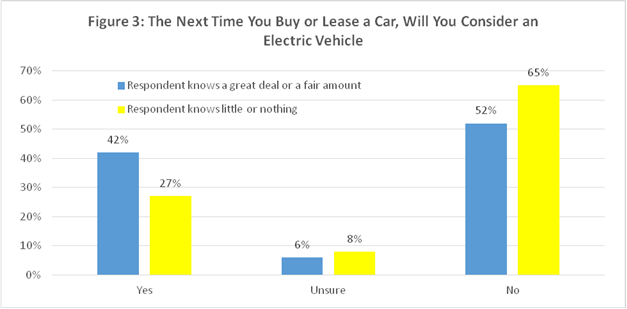Washington, D.C.—In a survey released today by the Consumer Federation of America (CFA), most Americans (54 percent) have a positive view of electric vehicles (EVs). While 33 percent of the respondents had no opinion, only 13 percent had a negative view of EVs. More significantly, almost one-third (31 percent) say they will consider buying an EV in their next car purchase even though, at this early stage, only one percent of vehicles sold are EVs. “While the current market penetration of EVs is small, there are currently 12 automakers currently offering a wide variety of EVs, so these consumers already have choices,” said Jack Gillis, CFA’s Director of Public Affairs and author of The Car Book and the new Snapshot Guide to Electric Vehicles.
Not surprisingly, the survey revealed that the more Americans know about EVs, the more likely they are to consider this purchase. However, only a little over a quarter of respondents say they know a great deal (6 percent) or a fair amount (21 percent) about EVs at this early stage of EV marketing and sales. “Clearly, there is a tremendous opportunity for EV sellers to take advantage of this interest as long as they engage in the same effective marketing that has moved millions of gas powered vehicles,” said Mark Cooper, CFA’s Director of Research.
“Our research shows a clear, statistically significant, correlation between knowledge about EVs and positive attitudes towards EVs. The more one knows about EVs, the more positively one feels about these vehicles,” said Cooper.
“Furthermore, there is a statistically significant correlation between positive attitudes about EVs and a willingness to purchase them—those who feel positively about EVs are more likely to consider purchasing one,” said Cooper.
About the EV Guide
“As the auto and tech industries pour millions and millions into the refinement of EVs, the American consumer is poised to bring those EVs home and plug them in,” said Gillis. Research demonstrates not only a strong general interest in EVs, but a correlation of that interest with EV knowledge. In order to improve consumer understanding of EVs, CFA’s Jack Gillis, author of The Car Book, is releasing The Car Book’s Snapshot Guide to Electric Vehicles.
“Our goal is to expose the public to the options available and thereby increase interest in learning more about these vehicles. With battery prices coming down, disruptive innovators like Tesla and Apple entering the EV market, and consumers looking for ways to reduce their dependence on the gas pump, there is no question that EVs are poised to become the next big thing in the automotive marketplace,” said Gillis. The Snapshot Guide to Electric Vehicles provides an overview of the key features of the 2016 model EVs allowing consumers to readily compare the mileage, range, and charging types available among the new models. The guide is designed to improve consumer knowledge and understanding of EVs as well as provide a comparative road map to the choices available for 2016. The guide is available here.
In addition to the main findings of the survey, the data shows that wealthier respondents and those with more education said they knew more about EVs and were more likely to express an intention to purchase. Males state more knowledge, and older respondents and males were more likely to express the intent to purchase. “These demographic correlations are typical of new product adoption and portend a positive future for the EV market,” said Cooper.
The following charts depict the major findings in the CFA survey. The survey was conducted for CFA by ORC International by cell phone and landline on August 20-23, 2015, using a representative sample of 1009 adult Americans. The survey’s margin of error is plus or minus three percentage points.
Overall Interest in Purchasing an EV
Overall, a surprising percentage of respondents are interested in purchasing an EV. This interest provides a catalyst for manufacturers to aggressively promote EVs and improve their designs.
How Does Knowledge about EVs Affect Attitudes Towards Them?
As Figure 2 shows, there is a correlation between consumer knowledge about EVs and their attitude towards them. While 71 percent of those that know about EVs have a “Very Positive” or “Positive” attitude about EVs, it is important to note that there is a remarkably high “Very Positive” or “Positive” attitude (49 percent) among respondents who indicated that they knew little or nothing about EVs. While knowledgeable consumers have a more positive attitude towards EVs, there is a general attractiveness of EVs among consumers regardless of their EV knowledge.
The Impact of EV Knowledge on Potential Purchase Behavior
In further analyzing consumers’ overall interest in buying an EV, we compared purchase desire between respondents more and less knowledgeable about EVs. We found a significant correlation between consumer understanding of EVs and their potential to purchase one. For consumers who understand “a great deal” or a “fair amount” about EVs, intention to purchase was much higher. This is strong evidence of the benefits for manufacturers who invest in promoting their EVs. Automakers are among the largest advertisers in the country; directing some of this investment towards EVs will clearly pay off in increased consumer purchases. Clearly, there is a benefit to consumers learning more about EVs.
Contact: Jack Gillis, 202-737-0766; Christina Heartquist, 415-453-0430
The Consumer Federation of America is a national organization of more than 250 nonprofit consumer groups that was founded in 1968 to advance the consumer interest through research, advocacy, and education.




